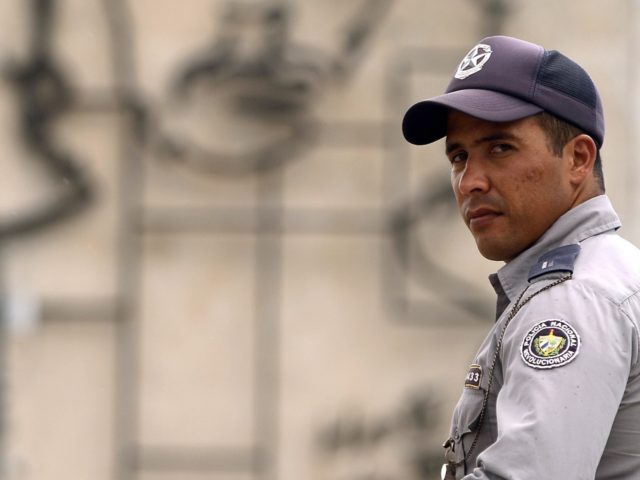The communist government of Cuba once again arrested Pastor Ramón Rigal and wife Ayda Expósito on Wednesday shortly before they had planned to leave the country. Rigal and his wife are at the forefront of an Evangelical movement against allowing the regime to educate their children.
The organization Christian Solidarity Worldwide (CSW) confirmed the arrests Thursday but did not provide details on what prompted them, according to the Spain-based Diario de Cuba. The Home School Legal Defense Association (HSLDA), which had aided Rigal during a prior arrest in 2017, also did not have word on any formal charges, but noted that Rigal and his family had planned to leave Cuba after the government threatened them into exile.
Mike Donnelly, HSLDA Director of Global Outreach, said that Rigal had reached out to the organization after “he was told he is not welcome in his homeland, but when he tried to leave with his family [this week], authorities stopped him. Now he believes he will soon be sent to prison.”
“They handcuffed me and took me to the station, and they told me that the UN could not do anything for me,” Donnelly quotes Rigal as saying. “My children are nervous and sad. The police told me they were going to arrest the other [homeschooling] parents, too.”
HSLDA had reportedly purchased plane tickets for the family to depart shortly before the arrest. According to Rigal, however, police said they would not let him leave if he did not “condemn the other families who are homeschooling their children and to tell them to stop and put their children in school.”
“This I cannot do,” Rigal reportedly said.
The association is now urging President Donald Trump to intervene on their behalf.
Rigal, pastor of the Evangelical Church of God in Guantánamo, was arrested in 2017 for refusing to send his children to government-run schools, where the curriculum places a heavy emphasis on communist indoctrination and worship of Cuban Revolution murderers like Fidel Castro and Ernesto “Che” Guevara. The government sentenced him to a year in prison, placed Espósito in house arrest, and prevented Rigal from making his case in court. The presiding judge in the case ruled that homeschooling was illegal because parents were not sufficiently skilled to “inculcate socialist values” in their children.
In addition to a heavy focus on communist indoctrination, Cuban schools suffer from major shortcomings in educating children on basic life skills. The schools, the outlet Cubanet notes, boast “inept teachers, uninterested students, [and] desperate parents unsatisfied with what their children learn but have no money to fix the problem.”
An international campaign spearheaded by Christian aid organizations pressured Havana officials to free Rigal after two months and continue his work as a pastor despite the regime having previously stripped him of his title.
“This is a far better outcome than I had expected. Based on my understanding of how Cuba treats its dissidents, I was increasingly certain that Ramón was going to lose and go to jail,” HSLDA’s Donnelly wrote at the time.
Rigal’s second arrest appears to be a response not only to his children being homeschooled, but to Rigal popularizing the method among Guantánamo parents. An unnamed source told Diario de Cuba that Rigal “has spent over two years at the forefront of nine families who took their children out of state schools and began homeschooling.”
“They [the Cuban regime] told me I am a ringleader; I inspire others to follow my example. They told me that I am a rebel,” Rigal reportedly told Donnelly recently.
The Castro regime has persecuted Christians for decades and, despite a warm relationship with Pope Francis, continues to do so as dissidents flock to the faith. Evangelicals often face particular animosity as they tend to worship in more decentralized formats, making the faith harder to control.
In 2016, a year before Rigal’s arrest, the regime executed a pre-dawn raid on an Evangelical church in Camagüey, arresting the pastor and destroying the church building in its entirety.
“Everything that is independent or has nothing to do with the official government bothers them, they don’t like it,” the church’s Pastor Bernardo de Quesada Salómon lamented following the raid.
Catholics also face persecution if they use their faith to challenge communism. The Ladies in White, one of Cuba’s most prominent dissident groups, attends Sunday Mass as its sole act of defiance. In response, Havana authorities have forced their local church to ban the women from attending services and beat, torture, and arrest the women on a weekly basis.
“Religious and human rights groups stated that the government harassed and detained outspoken religious figures, especially those who discussed human rights or collaborated with independent human rights groups,” the U.S. State Department said of Cuba in its 2017 religious freedom report. “Government security forces took measures, including detentions that were sometimes accompanied by violence, which inhibited the ability of members of the peaceful protest group Ladies in White to attend Catholic Mass.”

COMMENTS
Please let us know if you're having issues with commenting.